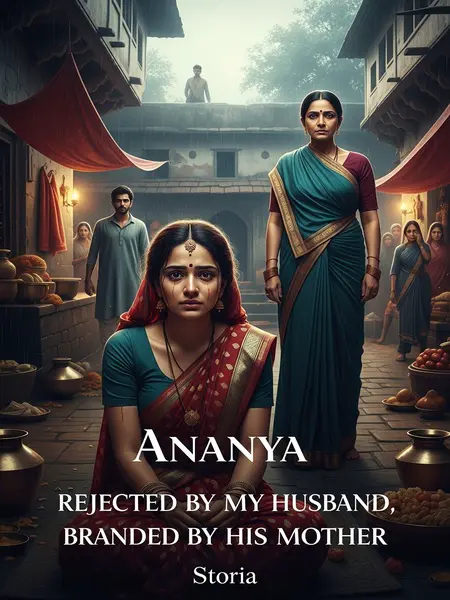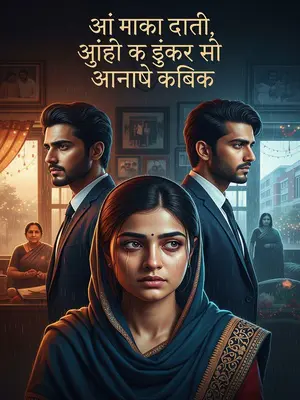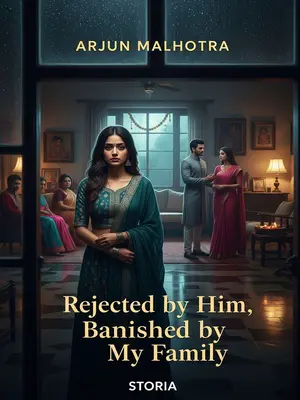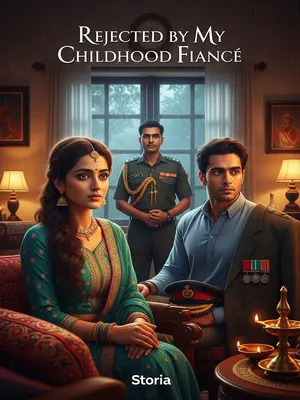Chapter 1: The Second Chance
From the moment I stepped into the Sharma house, my saas looked at me as if I’d brought bad luck along with my wedding trunk.
From the very first day, her eyes would narrow as if she'd caught a whiff of something rotten, her lips pressed in a line that rarely softened for my sake. In every small ritual and family event, I could sense her disapproval, thick as the smell of burnt masala in an unattended kitchen. During pooja, she would hand me the prasad last, her bangles jangling louder than her words. Not once did she offer me a gentle word, not even during the big festivals when the whole neighbourhood came to exchange sweets and fake smiles.
She despised the fact that I, born the daughter of a poor farmer, could marry her son and become the wife of a government babu.
It pinched her that a girl from dusty fields, one who walked barefoot to school, would one day sit across from her at the dining table—her son’s name on my tongue, my hands touching the family silver. To her, I was always just that farmer’s daughter, a reminder that fate had played a cruel joke.
She resented that, although her husband was dutiful, he refused to listen to her and divorce his wife to remarry.
Even after his death, that old pain festered in her heart. Sometimes, while watching her fix her hair in the cracked mirror, I could see the bitterness swirling in her eyes—she would mutter under her breath, “No one ever listens to me in this house.” The neighbours had their own versions of the story, but everyone knew she blamed my existence for her own lack of control.
She was even more bitter that I never bore children, leaving the Sharma family without a legitimate son or grandson.
When she walked through the lanes to the temple, heads would turn, voices whispering, "Arrey, the Collector’s wife is childless! Who will carry the family name?" I felt the weight of those words every time I passed the local school or heard the dhol at another family's naming ceremony. To her, my empty womb was a curse she could not forgive.
After being reborn, she couldn’t wait to break off my family’s engagement to her son.
Now, with her second chance at life, she wasted no time. She moved like a storm—her determination harder than the old neem tree outside our house. This time, she would decide who entered her family.
To stamp out her son’s lingering affection, she schemed to marry me off to the lame scholar in the village.
If she could not erase me from memory, she would banish me from the Sharma home—fast. For her, even a thousand whispered scandals were better than seeing her son gaze at me with any fondness. She set her sights on Kabir Joshi, the one boy whose prospects were as bleak as a drought-hit field.
She waited to see me sink into poverty and misery, living out my days in wretchedness.
She must have imagined me trudging through muddy lanes, face lined with sorrow, forever shamed in front of the village. I could almost hear her voice, "Let her see what real hardship is, then she will know!" She expected my spirit to shrivel with every passing year.
But unexpectedly, what awaited me was a national honour, surrounded by children and grandchildren.
I could never have guessed that fate would write a different story for me. In time, awards were placed in my hands, garlands around my neck. Children—some calling me Amma, some Nani—ran through my courtyard, their laughter filling every empty corner. I saw pride on the faces of people who once doubted me.
As for her son, he never left that small hill town again.
Rohan—once the centre of her universe—remained a shadow in the place he was born, unable to step into the world beyond those hills. Life has its ways of balancing old accounts.
Someone from the Sharma family had come to deliver the shagun and wedding gifts.
The air in our cramped 2BHK was heavy with expectation—the sharp scent of marigolds mixed with the pressure cooker’s whistle, while distant temple bells echoed through the monsoon air. I sat quietly on the wooden cot in our 2BHK flat—my face calm, but my heart was a swirl of mixed emotions.
On the outside, I folded my hands in my lap, back straight, as Amma had taught me, but inside, my mind was churning like the monsoon river outside. My foot tapped restlessly on the cool floor tiles, the old habit returning from my school days. My breath caught every time I heard footsteps in the corridor. In the kitchen, Amma’s bangles clinked as she adjusted the pressure cooker, trying to mask her anxiety with chores.
By rights, I should have already died, at the age of thirty-seven.
Somewhere in the echoes of the past, I could still feel the cold water closing over my head, taste the bitterness of regrets I never voiced. Thirty-seven—an age where most women in our colony were discussing their children’s wedding plans, not facing their own deaths.
There had been seven days of heavy monsoon rain in the district, and my husband, as the District Collector, was so busy he barely had a moment’s rest.
The radio in the living room kept repeating flood warnings, and the whole house smelt of dampness and fear. Neighbours kept calling, asking if “Collector Saheb” was safe. I watched the water seep through the cracks in the walls, wondering if fate would be kinder this time.
Distressed by her son’s exhaustion, my mother-in-law insisted on braving the rain to take me up the hill to the temple for a special puja.
She was convinced a special abhishek at the hilltop Shiv Mandir would change everything—perhaps finally bless our home with a child. I remember her fussing with my dupatta, her hands trembling as she muttered prayers under her breath, not caring about the rain lashing outside.
Who could have predicted that halfway there, our auto-rickshaw would be caught in a flash flood?
The auto-wallah, teeth chattering, had barely managed to swerve as the water gushed over the bridge. My mother-in-law screamed at him to move faster, clutching her bag of offerings tightly.
The muddy torrent, carrying broken branches and stones, thundered down from the hills, devouring us like a wild beast.
The sound was deafening—the kind that drowns out even your own heartbeat. I remember the auto being lifted off the ground, my hands clawing for something to hold on to, her bangles digging into my wrist as she clung to me.
My mother-in-law’s terrified screams somehow turned into my own mother’s gentle call.
In that moment, time twisted. Instead of my mother-in-law’s high-pitched shouts, I heard my Amma’s soft, melodic voice—like when she would call me in for lunch as a child. The chaos faded into a strange calm.
“Ananya, wake up. Don’t sleep.”
It felt like I was dreaming, unable to tell whether I was dead or alive.
Everything was hazy—like the world had gone underwater. I couldn’t feel my limbs, only Amma’s warmth pulling me back.
My eyelashes fluttered as I tried to open my eyes.
Each breath felt heavy, as though I was fighting through layers of cotton. Slowly, the familiar ceiling of our home came into view, patched and stained from old leaks, with a spider’s web glistening in one corner.
A face both familiar and strange came into focus—my young mother, holding my hand, reluctant to let go.
Her face looked as it did in my childhood—no streaks of grey in her hair, no lines at the corners of her eyes. She squeezed my hand softly, her thumb brushing away a tear before it could fall.
“In the blink of an eye, my Ananya has grown so big, already of marrying age.”
She said this with a mixture of pride and sadness—her voice thick with emotion. I could see myself reflected in her eyes, just as I remembered from when I was little and scared of sleeping alone.
“Today, the Sharma family is coming to deliver the shagun. Don’t sleep—get up and freshen up.”
Her words carried the weight of every tradition—shagun, gifts, family reputation. She fussed with the end of my braid, smiling to hide her nervousness.
The Sharma family, delivering wedding gifts?
I blinked in disbelief, my thoughts racing. Hadn’t all this happened years ago? Wasn’t I supposed to be long past this stage? Was fate really giving me another chance—or was this another cruel twist?
The warm cloth pressed against my face finally woke me up completely.
The scent of rose water lingered as Amma dabbed my forehead, her hands cool and steady. It brought me back to the present—a world both new and achingly familiar.
I couldn’t tell if this was luck or misfortune.
Was this my chance to right old wrongs, or was I being punished all over again? I looked at Amma, searching for a sign, but her face gave nothing away except love.
I was reborn at seventeen.
My hands trembled as I realised my youth had returned, along with all the insecurities of that age. But now, the old scars still throbbed under my skin, memories refusing to fade.
Thinking back on my previous life, I couldn’t help but clench the dupatta in my hand.
The cloth was rough, slightly faded—a reminder of all the times I’d twisted it nervously while waiting for my mother-in-law’s next command. Now, it was my anchor, grounding me in this impossible reality.
Such a long, wearisome life—must I really live through it all again?
The room spun with the possibilities. I pressed my forehead to my knees, silent tears slipping down. A part of me wanted to run, another to fight, and yet another simply to sleep, to forget.






